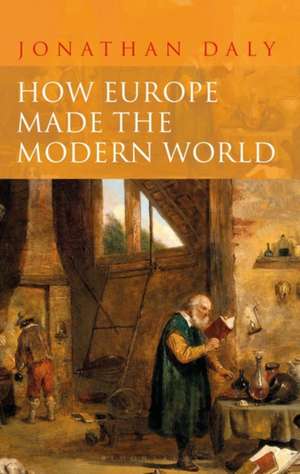How Europe Made the Modern World: Creating the Great Divergence
Autor Professor Jonathan Dalyen Limba Engleză Paperback – 2 oct 2019
| Toate formatele și edițiile | Preț | Express |
|---|---|---|
| Paperback (1) | 147.24 lei 6-8 săpt. | +46.64 lei 4-10 zile |
| Bloomsbury Publishing – 2 oct 2019 | 147.24 lei 6-8 săpt. | +46.64 lei 4-10 zile |
| Hardback (1) | 405.91 lei 6-8 săpt. | |
| Bloomsbury Publishing – 2 oct 2019 | 405.91 lei 6-8 săpt. |
Preț: 147.24 lei
Preț vechi: 179.93 lei
-18% Nou
Puncte Express: 221
Preț estimativ în valută:
28.18€ • 29.24$ • 23.55£
28.18€ • 29.24$ • 23.55£
Carte tipărită la comandă
Livrare economică 17-31 martie
Livrare express 07-13 februarie pentru 56.63 lei
Preluare comenzi: 021 569.72.76
Specificații
ISBN-13: 9781350029460
ISBN-10: 1350029467
Pagini: 248
Dimensiuni: 138 x 216 x 26 mm
Greutate: 0.36 kg
Editura: Bloomsbury Publishing
Colecția Bloomsbury Academic
Locul publicării:London, United Kingdom
ISBN-10: 1350029467
Pagini: 248
Dimensiuni: 138 x 216 x 26 mm
Greutate: 0.36 kg
Editura: Bloomsbury Publishing
Colecția Bloomsbury Academic
Locul publicării:London, United Kingdom
Caracteristici
Combines the latest research on the topic with classic historiography as well as the author's own argument and his examination of primary source material
Notă biografică
Jonathan Daly is Professor of History at the University of Illinois at Chicago, USA. He is the author is Historians Debate the Rise of the West (2015) and The Rise of Western Power: A Comparative History of Western Civilization (2014).
Cuprins
List of MapsPrefaceIntroduction: Alchemy of CivilizationChapter 1: The Supremacy of LawChapter 2: A Passion for TravelChapter 3: Tsunami of the Printed WordChapter 4: Rights and LibertiesChapter 5: An Anxiety for KnowingChapter 6: The Republic of LettersChapter 7: Breaking with TraditionConclusionNotesWorks CitedIndex
Recenzii
In this fascinating overview, Daly argues that Europe's economic rise did not depend on a geographic accident, such as having abundant coal beneath the ground. It depended instead on the ability of Europeans to create institutions that allowed them to unleash their creative potential. This book is an excellent introduction to the subject.
In this slim but engaging and deeply informed volume, Daly skillfully summarizes the complex and controversial literature on the role of Europe in the Great Enrichment. His treatment is without exception balanced and judicious, with a welcome emphasis on the centrality of culture and institutions in explaining modern economic growth.
Unlike most works by economic historians, this book tackles the Great Divergence from what Karl Marx would call the 'super-structure' of civilisations rather than 'material foundation' of them. This change in the reference system allows the author to view the divergence in very different light: rule of law, legal rights, knowledge accumulation and diffusion which permitted Western Europe to develop better than other parts of Eurasia. The reader will find a logically constant argument from the beginning to the end despite a degree of teleology which cannot be fully proved.
The text is only 147 pages and the small size of each of these is to be noted. In effect, Daly provides an account of the standard points in a way that is readily accessible to students.
In this slim but engaging and deeply informed volume, Daly skillfully summarizes the complex and controversial literature on the role of Europe in the Great Enrichment. His treatment is without exception balanced and judicious, with a welcome emphasis on the centrality of culture and institutions in explaining modern economic growth.
Unlike most works by economic historians, this book tackles the Great Divergence from what Karl Marx would call the 'super-structure' of civilisations rather than 'material foundation' of them. This change in the reference system allows the author to view the divergence in very different light: rule of law, legal rights, knowledge accumulation and diffusion which permitted Western Europe to develop better than other parts of Eurasia. The reader will find a logically constant argument from the beginning to the end despite a degree of teleology which cannot be fully proved.
The text is only 147 pages and the small size of each of these is to be noted. In effect, Daly provides an account of the standard points in a way that is readily accessible to students.
